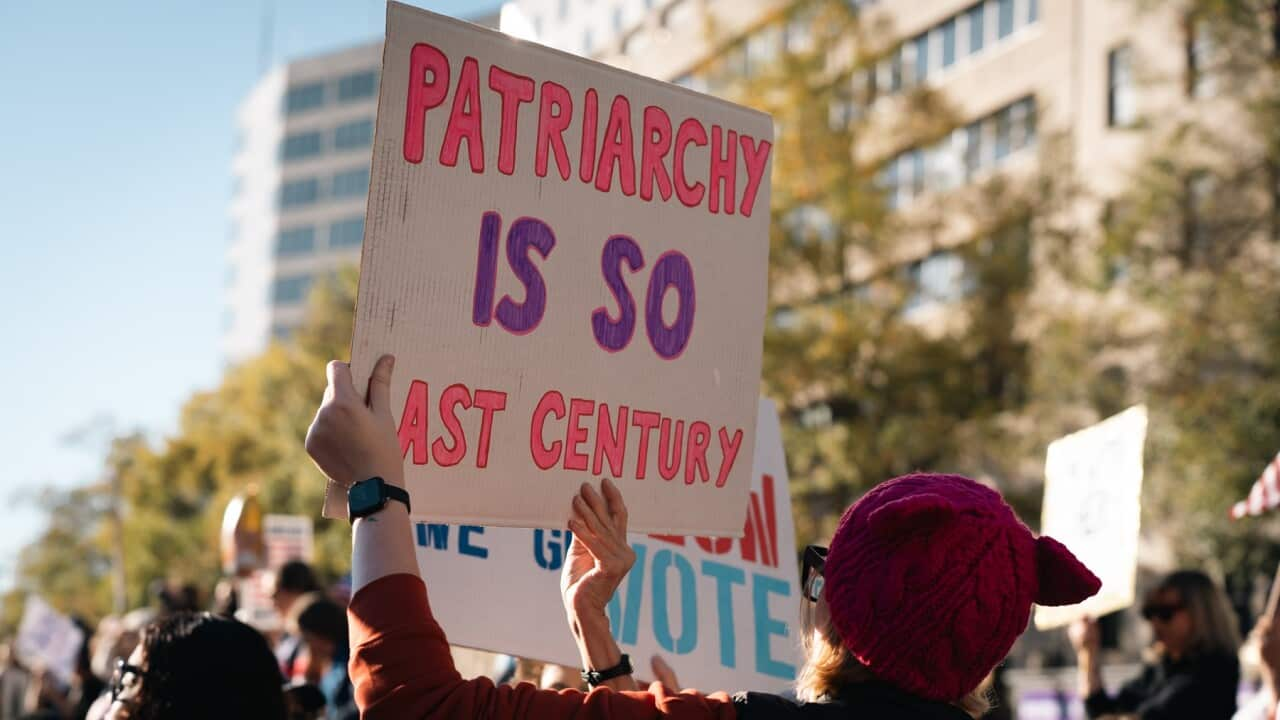TRANSCRIPT
"I will comment on the former President Donald Trump's remark about women and whether they like it or not, and listen, it's just, it actually is, I think, very offensive to women in terms of not understanding their agency, their authority, their right, and their ability to make decisions about their own lives, including their own bodies."
Kamala Harris' presidential campaign has frequently centred around bolstering women's rights - rights she stresses former president Donald Trump is intent on eroding.
Ms Harris was responding there to comments Mr Trump made just last week:
"And my people told me about four weeks ago, I would say no, I want to protect the people, I want to protect the women of our country. I want to protect the women. 'Sir, please don't say that'. 'Why?' 'We think it's very inappropriate for you to say that'. 'Why? I'm the president.. I want to protect the women of our country'.. They said, 'sir, I just think it's inappropriate'. I pay these people a lot of money, can you believe it? And I said well, 'I'm going to do it whether the women like it or not.'"
Mr Trump has taken credit for the overturning of Roe v Wade in 2022, which removed a woman's constitutional right to abortion, leaving each of the 52 states now able to rule on the issue.
Three of the Supreme Court judges behind this majority decision were appointed by Mr Trump during his presidency.
Here's the former president addressing the key election issue in August:
"For 52 years they wanted to bring abortion back to the states. They wanted to get rid of Roe v Wade. And that's Democrats, Republicans and independents and everybody, liberals, conservatives, everybody wanted it back in the states, and I did that. Now the states are voting."
Mr Trump's record on women's rights has long faced scrutiny- and just recently a 27th woman came forward with allegations of sexual abuse against the former president.
Issues around bodily autonomy are something sex workers, particularly in the United States, are concerned about.
US-based sex worker Amelia Lynn says she's voting for Kamala Harris over fears of a further erosion of women's rights under a Trump presidency.
She refers to Project 2025, a document which she says names Donald Trump over 300 times, despite his denials of any link to the manifesto.
"I do come from Texas, which is historically very much a Trump-supporting red state, but due to Project 2025, I will be voting for Kamala. I forget how many pages it is. I think it's like 800 or 900 pages, and it was written by the National Heritage Foundation, and half of the members of the National Heritage Foundation are from Trump's cabinet. The scariest one, I would say is abortion. So they're planning to ban abortion and make it illegal for any woman to get abortion, which is literally stripping a woman of their bodily autonomy. The thought of a nine-year-old getting raped and having to have this child and raise a child. No nine-year-old should have to go through that. Or a woman who's having an ectopic pregnancy, a pregnancy where they could die, they can't get an abortion for that."
In addition, Ms Lynn says plans to ban pornography are also included in Project 2025, which would limit work opportunities for sex workers.
It's not the first time sex workers in the U-S have been forced to fight for their bodily autonomy.
Ms Lynn points to the 'Fight Online Sex Trafficking Act and Stop Enabling Online Sex Traffickers Act' - also known as FOSTA-SESTA - which was passed under Mr Trump in 2018.
It's a bill that she says actually further endangered sex workers rather than preventing trafficking as promised, by prohibiting the advertising of sex work on commonly used sites like Backpages and Craigslist.
She says those sites actually enabled sex workers to ask for identification and take other measures to ensure their safety.
But she says Kamala Harris also advocated for the legislation.
"When FOSTA-SESTA did get passed, there's a few websites and from just sex workers I've talked to in general, they've said that there were a lot of girls that had to go back to the streets and they were actively harmed in the first month that it was passed, and it became a lot more dangerous. And there are some girls that were trafficked that said that it helped them get out of trafficking, but there's a lot of girls that went back to trafficking because now they can't work out of their own safety of their home."
Concerns about these issues are resonating with Australians.
An Australian-based sex worker - now chief executive of Australia's biggest organisation representing sex workers, Scarlett Alliance - says bills like FOSTA-SESTA have implications in Australia.
Mish Pony says the establishment of new sites has never been able to properly fill the gap left by the shutdown of prominent sites like Backpage.
It even signalled the end of their sex-working career.
"So just prior to the bill being introduced, Backpage was taken down by the FBI and that was a major site of sex worker advertising, including myself. I was advertising on Backpage at the time, and after that was shuttered it really through a wrecking ball, I suppose, through the private workers' ability to advertise. And so it absolutely meant sex workers had to alter the ways that we worked or advertised. It made it very difficult to engage with clients. It also meant it was very difficult to engage in screening processes, and so that all compounds into elevated levels of risks of violence."
And when it comes to bodily autonomy more broadly, as a non-binary person, Mish Pony is concerned a Trump presidency would amplify anti-trans discourse.
"We already see states in America introducing bans or limitations on gender-affirming healthcare. We've seen similar attempts within Australia, both at a federal and state and territory level, of politicians trying to introduce bills that either limit or restrict or otherwise call for inquiries into gender-affirming healthcare that are based on this assumption that it is harmful or that there's some harms that need to be investigated, which aren't supported by the best available evidence. Although a Trump presidency might increase that discourse, it's something that's already happening and something that we're already concerned about."
The trans community in the US has been on the receiving end of frequent debate throughout the course of the election campaign over their bodies and rights.
This is despite the fact trans people make up less than 1% of the country's population.
At a recent Madison Square Garden rally, Mr Trump said 'we will get transgender insanity out of our schools', and has regularly claimed falsely that children go to school and come home a few days later with an operation changing their sex.
He has also played a video mocking trans people at his rallies and spent millions of dollars on advertising based on statements Kamala Harris made in 2019, where she affirms her support for federal policies that allow prisoners access to medical care including gender-affirming hormone treatments and, potentially, transgender surgery.
This ad played in the swing states - those marginal states where the result could easily go either way.
"Kamala supports transgender sex changes in jail with our money. Kamala even supports letting biological men compete against our girls in their sports. Kamala is for they/them. President Trump is for you. I'm Donald J. Trump and I approve this message."
Trans, LGBTIQ+ people and allies have expressed their fears around derogatory messaging by the Republican side - including 44 year-old Ollie Robison who works at a not-for-profit pride centre in Michigan.
"When you're visibly out to the world, that puts you in an immediate position of danger when the main talking points at political rallies are anti-trans sentiments, and when main political talking points are anti-trans legislation, you know, and that's scary, especially when nobody is financing transgender surgeries in prisons."
Mish Pony says US election discourse on bodily autonomy is affecting the debate in Australia, and minority voices are very often excluded from the conversations.
"The crackdown on bodily autonomy generally affects all different kinds of communities. I would say bodily autonomy brings in access to abortion, access to gender-affirming healthcare. I would say it also includes sex work around the decisions we get to make about our body that don't impact other people. So I think there is an issue of internet regulation that negatively impacts sex workers, and we're finding that our voice is not being listened to and our concerns are not being addressed."













